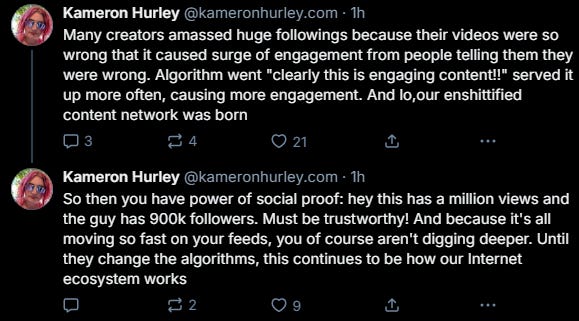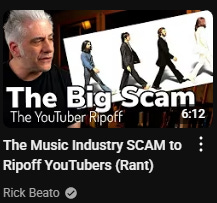I saw a pair of skeets earlier today on BlueSky that I wanted to call out and talk about.
Now, first thing’s first, Kameron is not wrong! BlueSky is a microblogging platform and there is only so much you can fit in your skeet. It is overtly stupid to complain that the skeet does not contain enough nuance or has not properly qualified its arguments. The brevity is compelled by the platform. I am adding further information, here. I am fairly certain that if Kameron does not wholly agree with me, we would find substantial common ground on the matter, differing only in a few particulars.
The problem here is not the algorithm, it is that we are accustomed to an ecosystem with a couple of factors that we’ve removed. We can put these back. There’s no reason we can’t. We took them away because we were frustrated by the ecosystem, and didn’t understand why it was the way it was.
The first factor is gatekeepers. Not so long ago, you didn’t get to have a platform unless you jumped through a bunch of hoops, and you could only speak to the people who showed up and listened. If you wanted to publish your screed about, say, “the internet ecosystem” and how “it’s not the internet” — you would have to send your proposal to an editor, who would stroke their chin and make a unilateral decision about whether you could write that for their publication. Usually that decision would be “no,” and then you would send it to another editor, and so on and so forth until you and everyone else lost interest in the subject. Then you would have to throw it out and write a new one.
This ecosystem meant that if your article showed up in “Family Housekeeping and Gardens,” everybody who read that magazine could trust that the editor thought it was a good article. And after you wrote twenty or thirty articles like it, you could publish them as a book, and then you would go around on a publicity tour and get on television. To show up on television, you needed to convince editors to publish a couple dozen of your articles, and then convince a publisher to bind them all together into a book. You jumped through twenty or thirty hoops on the way to that milestone.
Today, you don’t have gatekeepers. Any jackass can come to SubStack and open an account (even if they’re a Nazi!) where they can publish whatever arbitrary bullshit they want to publish. They can even stick a price tag on it and get paid.
I see a lot of writers lamenting that once upon a time you got paid for writing articles, and… nothing is stopping you. You can get paid. The tools are out there. If you are not getting paid, it’s probably a combination of (a) you’re not asking to be paid, and (b) you’re not worth paying for.
That’s certainly what it is here; this isn’t a profit centre, this is me writing consistently on a weekly basis so I am in the habit of doing it. The part where I make it worth paying for comes later, and only then do I think about asking people to pay for it. The important part right now is the habit.
But the lack of gatekeepers means that publishing your article no longer means anything. There is no public trust or approval of authority that comes with it. It just means you wrote something, and any jackass can write something. So how do you get your article to stand out and come to people’s attention?
Well, you don’t. Enter the second change: we all collect onto a platform that takes the place of the gatekeeper, not by having a gate only certain people can go through, but by sending an endless parade of people past us in an effort to keep us from walking back out the gate. Essentially, they say “come on in, we have this thing you like!” and then once you’re inside they assault you with eight million things people who like that thing also like, for sufficiently limited definitions of “like” — mostly “will look at instead of leaving.”
We used to collect on platforms that only had specific things. You did not subscribe to the everything magazine. You subscribed to a news magazine, and a sports magazine, and a hobby magazine, and an entertainment magazine. You got Newsweek, Sports Illustrated, Guitar World, and Cracked. Each of these cost about $20 annually, so the only people reading them were people who actually cared about them, and the lion’s share of their revenue came from ads.
If you picked up a copy of Sports Illustrated and they had an article about how the political economics of intellectual property have damaged the creative output of three consecutive generations, you would probably tell the editors that this is bullshit and you don’t want to see that. But that could easily go into Guitar World to explain why modern music sucks. Now that article shows up alongside literally everything else, competing for your attention.
But the third major issue that causes our ecosystem to be… this… is that nobody wants to pay for anything anymore. Nobody wants to buy a magazine. Nobody wants to buy a newspaper. They don’t want a subscription or a paywall. They want everything to be funded by advertisers, but they also don’t want to see any ads. And the only thing worse than seeing an ad… is seeing an ad that has been specifically targeted to you and your interests by paying attention to what you like and want. What about your privacy?!
So instead, the one platform you want to use, so you don’t have to go different places to see different things… has to show you ads for whatever garbage they can, without regard to what you want or like, just at random. And that makes ads less and less useful, because you don’t know anything about the person looking at them, and you’re not allowed to know anything about them. So advertisers pay less and less money, and platforms need to run more and more ads, and literally nobody likes any of this.
The core of the problem is that “one size fits all” is “one size fits none” and anything free is worth the price. If we want to have what we used to have — authoritative sources that aren’t stupid and wrong, that pay real money to actual creators, and aren’t absolutely flooded with garbage ads for random shit — we have to pay for it, and we have to curate a collection of multiple sources. That is it. That is all.
We did, in fact, used to have one place where we got all our shit. It was our chair, where we sat when we read the magazines next to it. The modern equivalent would be our computer, with a few bookmarks. We tried to solve this with RSS and nobody wanted to do the work of (checks notes) telling the RSS aggregator what feeds they wanted.
The social media bullshit landscape is not here because corporations are evil and greedy. It’s here because this is what we asked for.
If you want something else, you have to ask for it. Not just out loud, but with actions. With habits. With cash. You pay for what you get. Pay nothing, get nothing.



